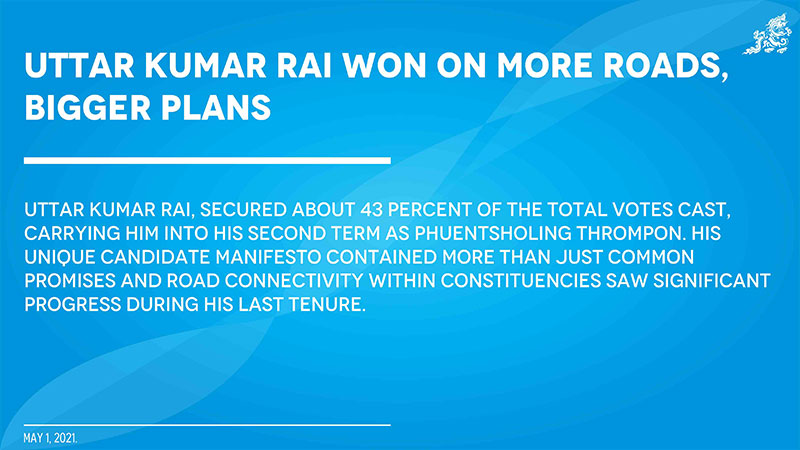Rajesh Rai | Phuentsholing
In 2016, Uttar Kumar Rai became the lone thrompon candidate when his competitor got disqualified just two days before the poll day.
He had a close run on the “yes” and “no” counts and won with just nine votes. Of the 487 voters who exercised their franchise, 248 had voted “yes” and 239 had voted “no.”
In five years, the turf had changed; the game had evolved. Although he faced tough competition with three strong opponents, Uttar Kumar Rai still secured 336 or about 43 percent of the total votes cast, a huge success considering the result in 2016.
Uttar Kumar Rai also had raced to the general round with just one vote advantage during the dhamngoi zomdu from his own constituency.
So what led to the win?
Uttar Kumar Rai, 39, said there are many factors for his victory.
“Firstly, I have won the trust of many people having served for five years without fail and delay. This has enriched the strong relationship with the people and built confidence,” he said.
He said people chose him to give a second run in the thrompon office so that he could continue ongoing works and activities.
Uttar Kumar believes being the lone native candidate was his strongest advantage.
“I never left for another place seeking opportunities. I was fully dedicated to serving my place where five generations of my family have lived,” he said. “It was the close bonding with the people.”
Most say it was his incumbent hold in Pekarzhing, Pasakha and Rinchending that led to the win this time. However, with the ECB not declaring the demkhong-wise votes, it can also only be guessed.
It was also evident in the 2016 election, Pekarzhing and Rinchending were Uttar Kumar’s stronghold. Then, 69 out of 126 had voted for Uttar Kumar Rai from Pekarzhing, while 39 people out of 55 voted for him from Rinchending.
Although Pasakha was not Uttar’s stronghold back in 2016, the dynamics had changed over the years. Pekarzhing and Pasakha also didn’t have thrompon candidates this time.
Development and pledges
On the developmental front, during Uttar Kumar Rai’s tenure, road connectivity saw major progress. All constituencies without (or with less) internal roads were connected including Pekarzhing, Pasakha and Rinchending, Phuentsholing Toed and his own demkhong Neydrag.
Although it cannot be ascertained if the candidate manifesto played any part, Uttar Kumar Rai had a few things different than the water, waste and other common promises.
In his manifesto, he had listed the construction of a direct access road from Rinchending to Pekarzhing and a four-lane road from RBA curve point to Rinchending Integrated Checkpost.
Uttar Kumar Rai also had pledged in his manifesto to make Phuentsholing a tourist town by developing Omchhu embankment. Craft bazaar, theme park, cable car and water kingdom were other projects he pledged.
Some mega projects like Phuentsholing Township and Development Project, and Mini Dry Port took place during his tenure.
A voter from Pekarzhing, BK Ghalley said there are four reasons why voters chose Uttar Kumar Rai despite other three equally able competitors.
“He kept close contact with the community and rendered the best possible service delivery,” he said, adding that the former thrompon also attended to residents in times of difficulties and provided necessary support.
“He is approachable.”
People also voted due to his experience as a thrompon because he can resume work soon after joining the office, BK Ghalley said.
Voter turnout
Unlike the 2016 election, the voter turnout this time far exceeded expectations.
A total of 782 voters out of the 925 eligible voters cast their ballots. This is 84.5 percent turnout—a huge difference compared to that of 62 percent in 2016.
Due to the ongoing lockdown in the bordering town, ECB conducted the voting on April 24 and April 25, prior to the poll day, April 28. This marks the country’s first ever thromde election in which voters cast their votes before the poll day. Counting was done on the poll day.
With many eligible voters stranded in other dzongkhags, the ECB also arranged voting for them by using the respective dzongkhag election offices. Stranded people were given the ballots to cast their rights.
Meanwhile, former thromde engineer, Devi Charan Dhimal, 56, who had worked in the thromde office in various roles gave a tough contest. He managed 220 votes.
Devi Charan Dhimal is from Phuentsholing Toed constituency.
The candidate from Rinchending, Karma Gelay, 53, received 154 votes. The lone woman contestant, Chhungku Dawa, 40 secured 72 votes, the lowest among the four thrompon candidates.


